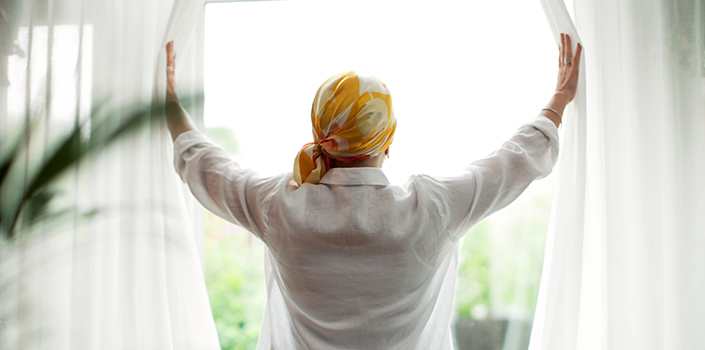At Humana, we’re working to make healthcare more human by making it more personal, a little easier and whole lot more caring. That’s why we get to know our members as people first and members second. Our Past is Present series highlights real Humana members’ real stories. Stories of perseverance and triumph. Stories of good fights won and challenges overcome. Stories of how the past shapes the present—for the better

Little Miss Sunshine.
Dorthy P. learned the value of humor and a positive attitude early on. Her dad was a preacher and a quiet man except for his spontaneous guffaws that got everyone else laughing right along with him. Dorthy delighted in those moments she could drum up her father’s big, belly laughs. Her mom was a bit ornery and liked to play jokes on people, even in church from time to time. She once pinched someone’s behind but Dorthy took the blame for it; from that day on she saw her mom as her mentor in getting into—and out of—trouble (the wholesome, good-natured kind). Her family celebrated joy, often turning to psalms and Bible passages that could lift up their spirits even in trying times.
Dorthy was known as “Little Miss Sunshine” around the congregation and town, but she had sass, too. She teased the adults in her life like their family doctor. She worked at the hospital during her teen years as a candy striper and never missed a chance to give their family doctor some guff. “I wouldn’t trust a thing he says,” she said with a wink to the other doctors. When they asked why, she answered, “Because he knocked the gold spoon out of mouth when I was born!” She called him a “regular bull in a China closet” due to his size but also praised him for what a fantastic doctor he was. They had a playful but respectful doctor/patient relationship. She wouldn’t realize how important this early lesson about hospital humor could be for a few more decades.
Laughter is the best medicine.
On September 9, 1999 while driving to work, Dorthy was in a terrible car accident that fractured her first and second vertebrae. She had pins all along her right side (her dominant side), which was numb and swollen for several months. She had to wear a neck brace. After that, she was in a halo for four months. Her physical therapy taught her how to hold her head up again, to walk, climb stairs, feed herself, shower, get dressed. All those things she took for granted before the crash.
Yet despite physical setbacks and incredible pain, Dorthy maintained not only a sense of humour but also a positive outlook. When she struggled to feed herself, she laughed at the child-like mess she’d made of her food and her clothes. When visitors came to cheer her up, they left in higher spirits themselves because of Dorthy. When her mother took photos of her after the accident, Dorthy joked she threw darts at them. She said to herself, “I’m still silly.” She focused on the things she could still do and laughed at herself when she struggled. She’s even kept one of the screws from the halo as a souvenir of sorts. She stores it in her jewelry box of all places, a little private joke about headgear as a fashion accessory. That tiny screw is a reminder of what it felt like when they removed her halo—“You feel like your head will hit the ceiling!”—and, most importantly, that she persevered.
Compassion meets chuckling.
Because of her accident, she developed more empathy and compassion for people with disabilities. She wasn’t able to work for a year and half. It took her seven years before she could climb stairs. “Your head weighs 11 pounds or so and takes more muscles than you realize to lift. You don’t realize using a walker, how much energy it takes. Or a cane to keep your balance.” She looks back on the accident with a wry sense of humor. “The first thing I remember is a roaring sound in the helicopter. The second is my mother looking around the curtains and hearing a horrible moaning sound. Turns out, that moaning was coming from me!”
Choosing joy.
As Dorthy has experienced life’s ups and downs, she “looks out for the good” and says, “I’m better for everything I’ve gone through.” She focuses less on what’s outside her control and more on what comes from within. She says she’s “at peace with what happens.” She “thinks young” and knows how to find the humor in things, even aging. She jokes she has “C.R.S. Can’t Remember Stuff.”
Every morning she sets a positive intention for the day. “Before my feet hit the floor in the morning, I know something good’s coming to me. I set the pattern right there.” She cultivates gratitude. She finds ways to stay engaged whether it’s playing with her three dogs, talking to friends on the phone or reading the Bible. She cultivates gratitude. She finds ways to be not just content but happy.

Personalized care starts with one person: your Humana Sales Agent.
Humana will connect you with a licensed sales agent in your community.
And they will help you find a Humana Medicare Advantage plan with access to primary care that’s right for you.





